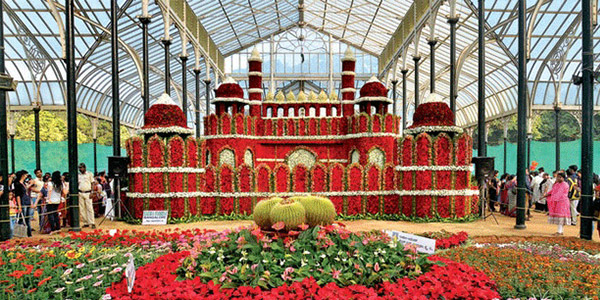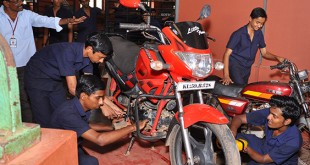ITI in Floriculture and Landscaping
Floriculture & Landscaping is an agricultural based vocational trade. The duration of trade is one year with two semesters of six months each. Floriculture is a study concerned with the cultivation of flowering and ornamental plants for gardens and for floristry, comprising the floral industry; and landscaping means any activity that modifies the visible features of an area of land. Students are taught about topics such as the sun heat each area receives, slopes in the landscape, soil type, drainage and other factors that affect plant growth; marketing plans, set budgets, order supplies, and ensure proper working conditions of equipment. This agriculture related trade is an important in job offering in various fields including self-employment
Skills Required
- Students are suitable for it working independently and apply the latest trends to their work.
- They should be able to operate tractors and equipment, undertaking irrigation activities, establishing and maintaining crops and treating weeds, pests and diseases.
- Students should also know common things like preparing soils for planting, implementing crop planting and maintenance programs, coordinating harvesting and supervising work site activities.
- Candidates willing to go for further higher studies also good suit for this trade. They can get admission in Diploma/Degree courses.
Syllabus
1st Sem
- Agro Meteorology – Identification of meteorological instruments.
- Basic Knowledge on Plant Biology – Germination, parts of roots, stems flowers and seeds. Identification of families/varieties.
- Soils and Soil Management
- Role of organic matter in soil and its recycling
- Soil fertility, Manures and Fertilizers, Fertility Management
- Identification of seeds of Green Manuring crops
- Identification of bio-fertilizers
- Fundamentals of Floriculture Common garden operations using
- Handling of soils, purpose of nursery bed, potting media, potting etc.
- Propagation by cutting, budding, greating. Audio Visual demonstration.
- Handling of seeds, bulbs, cut flowers, nursery plants, pot plants.
- Acquaintance with soil types, various manures, fertilizers, Vermi compost, pesticides, growth regulator.
- Nursery and Seed Production
- Planting Materials and their Cultivation Practices
- Project Work
2nd Sem
- Commercial Flowers – Identification and study of important commercial varieties of the flowering crops
- Landscaping & Indoor Gardening
- Protected Cultivation of flowers Identification and study of poly house, shed net house, mulching.
- Apiary – Familiarisation with species of honey bees & different types colony organization and bee boxes
Eligibility & Admissions
- Passed 10th Class Examination
- Performa for admission may be obtained from the respective State Directorate dealing with Craftsmen Training Scheme or from the Principals of the concerned Industrial Training Institutes/ centers conducting training programme under Craftsmen Training Scheme.
Higher Studies
- Advanced Diploma in Floriculture
- Diploma in Floriculture
- Diploma in Floriculture and Landscape Gardening
- Certificate Course in Floriculture
- Certificate in Floriculture Technology
- Certificate in Gardening
- B.Sc. (Floriculture and Landscaping)
- M.Sc. (Floriculture and Landscaping)
Job Prospects
- After passing trade, they can have as job a wide range of growing and harvesting tasks which include operating tractors and equipment, undertaking irrigation activities, establishing and maintaining crops and treating weeds, pests and diseases.
- They can also start floriculture on big scale so as to sell these in market as flowers are used every-day in many things/occasions.
- Students having good academic records can apply for further higher education with a purpose of enhancing current position in case already have job or for their overall value-increase.
Floriculture & Landscaping Trade Job Types
- Floriculturist
- Gardener
- Floricultural Tradesperson
- Green-keeper
- Landscape Gardener
- Nursery Worker
- Floricultural Worker
- Horticulturist
Employers
Some of the potential employers:
- Floriculture units: Floriculturists are majorly involved in the propagation and growing of cut flowers, flowering potted plants, foliage plants and bedding plants. They plant, prune, water, fertilize, harvest and ship these plants as well as monitor and also manipulate the environment under which they are grown both indoors in greenhouses and outdoors in field production where the climate is favourable.
- Outdoor design consultancy firms: Companies which are engaged in horticulture landscaping and plantation employ floriculturists and horticulturists in supervisory positions and for development and maintenance of gardens.
- City planners and builders and those who carry out the work of maintenance at various sites employ floriculturists and horticulturists.
- Cosmetics and perfume industry-Value addition in the form of extraction of pigments, essential oils, pharmaceutical and nutraceutical compounds has emerged as one of the frontline avenues in floriculture and it is in this connection that floriculturists are employed in the perfume industry.
- Self employment- You can set up your own venture, growing flowers for the domestic or export market, growing ornamental plants, running nurseries, or providing gardening and landscaping advisory services.
In India, Karnataka is the leader in floriculture, accounting for 75% of India’s total flower production. The state has highest area under modern cut flowers, and 40 flower growing and exporting units. The expert committee set up by Govt. of India for promotion of export oriented floriculture units has identified Bangalore, Pune, New Delhi and Hyderabad as the major areas suitable for such an activity especially for cut flowers. APEDA (Agricultural and Processed Food Products Export Development Authority) is the registering authority for such units.
The employment opportunities in such a field is as enormous as the nature of work itself. One can join the field of floriculture as farm/estate managers, plantation experts and supervisors, project coordinators, etc. Research and teaching are some other avenues of employment in the field. Marketing of Floriculture products for different ventures is emerging as a potential segment of this field. Besides one can work as consultant, landscape architect, etc with proper training. One can also work as an entrepreneur and offer employment to others. In addition to these careers which involve research and actual growing of crops, floriculture also provides service career opportunities which include such jobs as floral designers, ground-keepers, landscape designers, architects and horticultural therapists. Such jobs require practitioners to deal directly with clients. Professional qualification combined with an inclination towards gardening and such other activities produces efficient floriculturists and landscaping professionals. The skills and knowledge required are imparted under the professional courses of floriculture and landscaping.
 Courses and Colleges after 10th After 10th, What Next?
Courses and Colleges after 10th After 10th, What Next?








